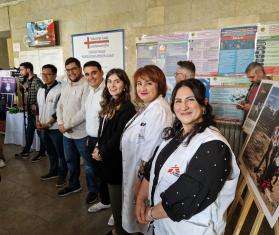Doctors Without Borders/Médecins Sans Frontières (MSF) has joined Haitian health authorities in their emergency response to a resurgence of cholera officially declared this week by Haiti's Ministry of Public Health.
The last confirmed cholera case in Haiti had been recorded in 2019, at the end of a devastating nine-year cholera epidemic that killed close to 10,000 people.
In Port-au-Prince, MSF has opened a 10-bed cholera treatment center (CTC) in the Brooklyn neighborhood, a 20-bed CTC in the MSF emergency center in Turgeau, and a 50-bed CTC in the MSF hospital in Cité Soleil, as well as various oral rehydration solution (ORS) distribution points. The CTC in Cité Soleil is ready to receive new cholera patients, while the other units have already reached their maximum capacity.


The cholera treatment center in Cité Soleil.
Over the past few days, people identified as potentially affected by the disease have presented to the MSF emergency center in Turgeau and the MSF Cité Soleil hospital, exhibiting symptoms like severe diarrhea and vomiting. A sample from a patient in Turgeau was found positive for cholera by national laboratory tests.
As of October 3, MSF had admitted 68 patients to its facilities in Brooklyn, Cité Soleil and Turgeau. Sadly, one of those patients—a three-year-old child—died.
Cholera is a highly contagious disease that occurs in settings without clean water and proper sanitation—from remote villages to overcrowded cities, refugee camps, and conflict zones. It causes profuse diarrhea and vomiting, and without treatment can quickly lead to death by dehydration.
This resurgence of cholera is taking place at a time when people in Haiti face enormous difficulties in accessing health care. Insecurity and violence, coupled with severe shortages of fuel and drinking water, have forced many health facilities to reduce their activities and in some cases to stop them altogether. In addition to this, people who need treatment find it increasingly difficult to move around as public transportation is scarcely available due to a lack of fuel in the country.




